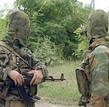
Federal Forces in Chechnya Will Reportedly be Reduced and Restructured
Publication: North Caucasus Weekly Volume: 10 Issue: 18
By:

Itar-Tass reported on May 6 that the number of federal troops in Chechnya will be cut in half and that the Combined Group of Forces in the North Caucasus will be transformed into a new security body provisionally called the Committee for Maintaining Security in the Region.
The news agency quoted a law-enforcement source as saying that since the counter-terrorist operation in Chechnya was formally lifted last month (North Caucasus Weekly, April 17), it is no longer necessary to keep a large number of forces in the region. Therefore, the interior ministry and army troops, which were “temporarily” deployed in Chechnya, will be withdrawn and the Combined Group of Forces will be cut by at least half. The law-enforcement source also said that “specialists” will be sent to Chechnya to coordinate efforts to ensure security, law and order, and help republican law-enforcement bodies, and that the “main role” in these efforts will now be played by Chechnya’s Interior Ministry, Chechnya’s OMON (special-task police force) and the military commandant’s offices in the republic.
Itar-Tass said the date when the new Committee for Maintaining Security in the Region will start operating has not yet been determined, but that it will probably be at the end of the summer or beginning of the fall. The news agency reported that the committee will be headed either by the Russian Security Council or the Main Staff of the Russian Interior Ministry’s Internal Troops.
For its part, Interfax on May 6 quoted a defense ministry source as saying that the Combined Group of Forces would be disbanded by September 1 and replaced by an “operational group” consisting of forces from the defense ministry, the interior ministry’s internal troops and other security forces. The source said the new operational group is needed in case the situation in Chechnya worsens and a new “counter-terrorist operation regime” has to be imposed. The source said that with the disbanding of the Combined Group of Forces, other units currently deployed in Chechnya “on a temporary basis” would be removed—mainly interior ministry and defense ministry units—and that this would require reducing the structure of the military prosecutor’s office in Chechnya while “optimizing” the central military commandant’s office in the republic. Interfax’s defense ministry source added that the implementation of these plans would depend on the situation in Chechnya—which, he said, remains far from stabilized.
Meanwhile, a spokesman for the Russian military’s operational headquarters in Chechnya, Vladimir Patrin, and a spokesman for the interior ministry’s internal troops, Colonel Vasily Panchenkov, both told RIA Novosti that they had no information concerning the possible disbanding of the headquarters for the Combined Group of Forces in the North Caucasus.
Gazeta.ru on May 6 quoted Aleksandr Cherkasov of the Memorial human rights group as calling the new Committee for Maintaining Security in the Region the same kind of “wondrous beast” as the recently canceled counter-terrorist operation, noting that the latter operated outside the law for ten years (1999 to 2009), during which the siloviki got used to operating in Chechnya according to their own logic.
“I don’t know to whom this new body will be subordinated and how it will fit into the existing system of control by the siloviki in the Caucasus,” he told the website. Cherkasov added that he thought the disbanding of the Combined Group of Forces was more a matter of simply “renaming” the forces and that it remains unclear whether it will mean real changes in status or chain of command. “In Chechnya, a special system of subordination and coordination of the force structures emerged, and this isn’t going anywhere,” he told Gazeta.ru. “Let’s separate what’s on paper from the logic of bureaucratic structures.” In particular, Cherkasov noted that despite the official end to the counter-terrorist operation in Chechnya, Federal Security Service (FSB) and interior ministry personnel are still carrying out special checks of people arriving from Chechnya at Moscow’s Vnukovo airport.
The news agency Gazeta.ru published an article on May 6 about Moscow’s plans to replace the Combined Group of Forces with the Committee for Maintaining Security in the Region with the headline: “The Committee for the Control of Kadyrov,” which indicates what it thinks are the reasons behind the creation of the Committee for Maintaining Security in the Region—and an apparent reference to the comments by various siloviki expressing doubts about the stability situation in Chechnya.
The article headline may have been alluding to the fact that there are those within Russia’s security and military establishment who are unhappy with the degree of independence and power that Chechnya’s president has gained with ending of the counter-terrorist operation there. As Gazeta.ru noted, Chechen President Ramzan Kadyrov has not yet commented on the reports that federal forces in Chechnya will be halved and that the Combined Group of Forces will be replaced by a new structure.




